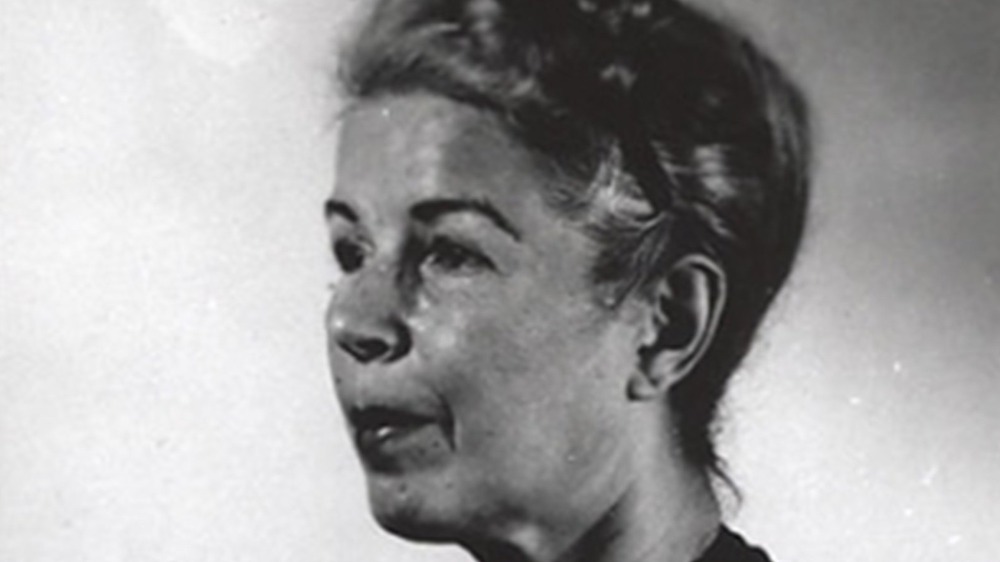The True Story Of The Women Who Voiced Axis Sally
Back in World War II, both sides employed heavy propaganda to push their agendas. The United States had Captain America. The US Army distributed copies of the first issue of Captain America to its troops, and the character has gone on to be featured in the recent Marvel movies. The Axis powers, on the other hand, utilized radio personalities like Axis Sally. Her dulcet tones and swing music both comforted and scared American troops. She would often warn soldiers that their girlfriends were probably enjoying life without them. Her goal? To demoralize the troops.
Axis Sally was voiced by two women, though only one claimed the name. Mildred Gillars (pictured above) and Rita Zucca were both Americans who found themselves abroad when the war started, wrote HistoryNet. According to Smithsonian Magazine, Gillars was born in Portland, Maine, in 1900. She cultivated a cult of personality in her broadcasts, something she knew how to do as a former showgirl. Growing up in Ohio, Gillars wanted to be in showbiz. So she left school and moved to New York City, Warfare History Network said, and performed on Broadway. Eventually, she ended up in Europe. She learned German and got herself a fiance. When the war began, her fiance, a naturalized German citizen, said he would leave her if she left for the U.S. Gillars stayed and took a job at the German State Radio. And so Gillars began working for the Nazis as Axis Sally.
The other Sally
Gillars, though, was not the only Axis Sally. Zucca was also an American who chose to work for the Italian Fascists. According to HistoryNet, Zucca's family owned a popular restaurant in New York City.
Zucca went to a convent school in Florence, Italy, and returned to Italy to work as a typist. Her family had property in Italy that was in danger of confiscation by the Mussolini regime, so Zucca renounced her American citizenship. In 1942, Zucca was fired from her job as a typist for copying an anti-Fascist pamphlet. But she got her revenge the year after. The Italians saw the success of Gillars' Axis Sally, so they decided to copy the German show when Allied Forces made their way to Italy. And so began Zucca's time as the Italians' version of Axis Sally. Smithsonian Magazine said Zucca signed off each broadcast with "a sweet kiss from Sally."
Both women broadcast radio dramas exaggerating how bleak life back home is without the soldiers serving overseas, trying to demoralize the GIs. They also both played popular swing and jazz music. American soldiers heard their programs and liked them. Unlike Gillars, however, Zucca was not afraid of broadcasting troop movements. Gillars had been cautious about openly using army intelligence to shield herself from any lawsuits after the war. Zucca's broadcasts so angered Gillars that she threatened to quit, but her threats were empty, as she kept working until the end of the war.
Gillars was right to be worried. The Axis fell, and the two women faced charges of treason.
Charges of treason
Zucca gave birth to a son near the end of the war. She went back to work 40 days after, but had to take refuge when Allied Forces seized Milan. She ran to an uncle's farm in Turin before being captured in June 1945. The New York Times reported her family in New York had no idea she willingly worked against the United States. They believed she was forced into it. However, since Zucca had renounced her American citizenship, the U.S. couldn't try her for treason. But that didn't stop Italy. She served nine months in prison after the war, and afterwards remained in Italy, dying there in obscurity in 1998.
Gillars, on the other hand, was still an American. She had been in a relationship with her radio show's writer and thought he would leave his wife and marry her. But instead, he died in 1944. Gillars was caught by U.S. intelligence in 1946. She was brought back to the US in 1948 to stand trial.
Gillars made sure her trial would be theatrical. Per Warfare History Network, she showed up with fur coats and her hair coiffed. At some point, there was a fainting spell. Gillars claimed she never betrayed her country, that her broadcasts were a performance she was paid to do. She did not convince the jury. Gillars was sentenced to 10 to 30 years in prison and fined $10,000.
In prison, Gillars converted to Catholicism and taught at a convent after her release in 1961. She died of colon cancer in 1988.


